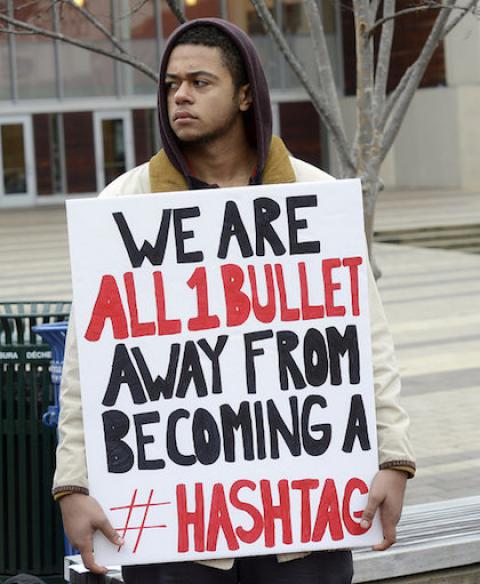Reporters at The Washington Post are keeping a running tally of people shot and killed by police in 2015. It's something the FBI also does, but the bureau itself concedes that its total count is incomplete. In fact, according to the Post, the FBI has never counted more than 460 fatal police shootings in a single year. In its own count, however, the newspaper found such shootings added up to one more than that in just the first six months of this year. More than a fourth of those slain, the reporters say, were "in the throes of mental or emotional crisis":
The vast majority were armed, but in most cases, the police officers who shot them were not responding to reports of a crime. More often, the police officers were called by relatives, neighbors or other bystanders worried that a mentally fragile person was behaving erratically, reports show. More than 50 people were explicitly suicidal.
More than half the killings involved police agencies that have not provided their officers with state-of-the-art training to deal with the mentally ill. And in many cases, officers responded with tactics that quickly made a volatile situation even more dangerous.
The Post summarizes several of these killings. The dead range in age from 15 to 86. On average, police killed a mentally disturbed person every 36 hours in the first six months of the year.
Police departments concede that they are not well equipped to deal with the mentally ill. But given the inadequacy of state and local budgets for mental health services, needlessly violent police responses are likely to continue.
So far, police departments generally have not risen to the challenge. Although new recruits typically spend nearly 60 hours learning to handle a gun, according to a recent survey by the Police Executive Research Forum, they receive only eight hours of training to de-escalate tense situations and eight hours learning strategies for handling the mentally ill.
“This a national crisis,” says Chuck Wexler, executive director of the Police Executive Research Forum. Police departments need to "rethink how they handle encounters with the mentally ill." he says. "Training has to change.”
As we have seen all too often, trigger-happy police are not uncommon in 21st Century America. Although most of the mentally disturbed people police have killed in encounters this year have been armed, the weapons are usually not firearms. In fact, 3 out of 10 of those slain were carrying knives or some other kind of blade. In the past decade, according to the FBI and other police agencies, only three police officers have been killed by an edged weapon.
A national crisis ought to mandate a national solution. Parents or other relatives should not be afraid that if they call authorities, the police will arrive guns blazing because a mentally ill member of their family is having a bad episode.
The federal government has been promiscuous in supplying billions of dollars worth of military-grade weapons and other equipment to local police departments that few if any need. But where are the billions for better training, not of a select few, but of entire police forces? Where is the nationwide push for establishing and implementing wiser, common-sense protocols for police encounters with the mentally ill? Why isn't this—along with the plethora of police shootings of unarmed people—not generating a focused response from those who are supposed to serve and protect? This is, after all, not exactly a new problem.
[Meteor Blades is the on-line moniker of Timothy Lange, Daily Kos Senior Political Writer.]


Spread the word